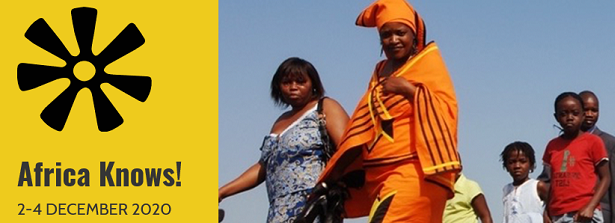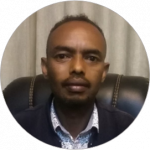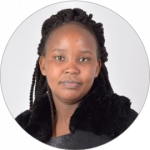Africa Knows! conference – Panel 47 on ATVET in Africa

The conference Africa Knows! is the closing activity of the Africa 2020 Year of the Leiden African Studies Assembly and takes place online on December 2-4, 2020. On December 3, F&BKP co-organizes Panel 47 on “Agricultural Tertiary and Vocational Education and Training (ATVET) in Africa: integration within the broader Agricultural Knowledge and Innovation System”.
“Africa Knows! It is time to decolonise minds” is the closing activity of the 2020 Year of Leiden African Studies Association. The conference starts with an online opening event on December 2-4, 2020, which is organized with many partners from Africa and Europe, introduces several keynote speakers and is composed of 50 panels.
You can now register online for the conference through the Africa Knows! website.
Panel 47
Panel 47 on “Agricultural Tertiary and Vocational Education and Training (ATVET) in Africa: integration within the broader Agricultural Knowledge and Innovation System” focuses specifically on how ATVET can bridge the gap between higher education, other forms of learning, and the business community. A background discussion document prepared for this panel will present an overview of how the ATVET sector is organized, and how it relates to the broader national agricultural knowledge and innovation systems (AKIS) in Africa. Recommendations will focus on providing and scaling sustainable agro-food education and training in Africa.
On December 3, 2020, the panel organizes a morning session at 11.30 CET and an afternoon session at 14.30 CET. By registering for the conference, you will automatically get access to the sessions: please register online on the Africa Knows! website.
Downloads
Please download in PDF format:
- The Panel 47 programme
- The draft report “ATVET in Africa: Overview and integration within broader agricultural knowledge and innovation systems”
- The Session 2 breakout group Ethiopia case paper
- The Session 2 breakout group Kenya case paper
- The Session 2 breakout group Ghana case paper
- The Session 2 breakout group Nigeria case paper
Panel programme Session 1 – 11.30-12.45 CET
| Policy Reforms for Agricultural Tertiary and Vocational Education and Training (ATVET) in Africa | |
| Welcome and Opening Remarks | Jennie van der Mheen, WUR |
| Continental policies, strategies & programmes | Caroline Mutepfa, AUDA-NEPAD |
| National Policy Case Study 1: Kenya | Eusebius Mukhwana, KNQA |
| Open Discussion | Alice Mweetwa (moderator), RUFORUM |
| Concluding Remarks | David van Kampen, NUFFIC |
Session 1 – Speakers
 Caroline Mutepfa, Senior Programme Officer -ATVET , Youth Employment and Skills Development at AUDA-NEPAD Agency.
Caroline Mutepfa, Senior Programme Officer -ATVET , Youth Employment and Skills Development at AUDA-NEPAD Agency.
Caroline is a passionate Development expert whose experience spans working for the Private Sector and International Development partners and the African Union organs. With over 10 years of experience within the Agriculture sector, and Employment and Skills Development field, she brings a wealth of experience, approaches as well as an innovative and curious mind that always seeks for ways to improve existing structures by application of new methods and tools. She is experienced in policy development, advocacy and in developing and implementing frameworks and programmes at the continental level in Africa. Having worked in skills and training for over 20 agriculture value chains, she has a broad and diverse background and specialises in value chain development and strengthening with a particular focus on women’s empowerment, skills development, entrepreneurship, youth inclusion, market linkages and access to credit and finance in the rural agriculture sector.
 Dr. Eusebius J. Mukhwana, Director General, Kenya National Qualifications Authority (KNQA).
Dr. Eusebius J. Mukhwana, Director General, Kenya National Qualifications Authority (KNQA).
Dr. Eusebius J. Mukhwana is passionate about creating change for the better. As a veterinarian, he expressed his passion through caring for animals. As a professor, he transferred that passion to others through teaching. As an NGO Executive, Mukhwana worked passionately with smallholder farmers to improve their agricultural productivity and incomes while conserving and enhancing the environment. Dr Mukhwana currently serves as the Director General/CEO of the Kenya National Qualifications Authority (KNQA); a body that is charged with the responsibility of Regulating and Assuring the Quality of Education in Kenya (Basic, TVET and University Education). He has previously worked as a Deputy CEO with the Commission for University Education (Kenya).
Session 1 – Moderators
 Jennie van der Mheen, Manager International Cooperation Africa at Wageningen University & Research (WUR) in the Netherlands.
Jennie van der Mheen, Manager International Cooperation Africa at Wageningen University & Research (WUR) in the Netherlands.
She holds a MSc degree in Rural Sociology of the Tropics. Before her appointment at WUR, she has been working as an independent consultant providing services to companies and producer organisations on sustainable value chains, and has worked for a co-funding agency in the Netherlands that co-created development programmes with local organisations in Africa. Prior to her work in the Netherlands she has worked for 15 years in sustainable agriculture programmes that were implemented by international organisations (FAO, IFAD, WB, UN) and local NGOs in various African countries.
 Alice Mutiti Mweetwa, Deputy Executive Secretary for Programme Development and Implementation at the Regional Universities Forum for Capacity Building in Agriculture (RUFORUM) Secretariat in Kampala, Uganda.
Alice Mutiti Mweetwa, Deputy Executive Secretary for Programme Development and Implementation at the Regional Universities Forum for Capacity Building in Agriculture (RUFORUM) Secretariat in Kampala, Uganda.
She is the immediate past Deputy Director for Research and Post Graduate Studies of the University of Zambia (UNZA), a position she held 2017-2019 and a past Deputy Dean for Post Graduate Programmes of the School of Agricultural Sciences (2013-2017). She served on several University boards and committees for quality assurance, policy formulation, income generation, Senate, journals publication, to mention a few. Dr Mweetwa is a Senior Lecturer of soil microbiology and general soil fertility in the Department of Soil Science. She has a bachelor’s degree in Agricultural Sciences (Crop Science Major) from UNZA, a master’s degree in Agronomy also from UNZA, a master’s degree in Environmental Science from Miami of Ohio, and a Doctoral degree from Virginia Polytechnic Institute and State University.
Panel programme Session 2 – 14.30-15.45 CET
| Integration of ATVET into broader systems of agricultural knowledge, skills and innovation | |
| Welcome and Opening Remarks. Summary of session 1 | Frans Verberne, F&BKP/NFP |
| Background Study Report – Agricultural Tertiary and Vocational Education and Training (ATVET) in Africa: integration with broader AKIS | Richard Hawkins, F&BKP/NFP/ICRA |
Break-out sessions 4 case studies:
|
F&BKP/NFP/RUFORUM/WUR |
| Reporting back from sessions and concluding remarks | |
Session 2 – Speaker
 Richard Hawkins, Partnerships and Project Development, iCRA Foundation, Wageningen, the Netherlands.
Richard Hawkins, Partnerships and Project Development, iCRA Foundation, Wageningen, the Netherlands.
Richard’s career has focussed on strengthening capacity for rural innovation with smallholder farmers, working with research and education organizations across Africa, Latin America and Asia. His 40 years of experience includes spells as crop scientist, farming systems advisor, trainer, project manager, consultant, and NGO Director, among others. Richard is most proud to have interacted with hundreds of trainees from across Africa over 30 years, many of whom have gone on to become project leaders, research directors, trainers, professors, faculty deans, university presidents, consultants, entrepreneurs and senior government officials. His recent interest has focussed more on strengthening Agricultural Technical, Vocational Education and Training (ATVET), with studies of ATVET in East Africa, Nigeria and now Sub-Saharan Africa, as well as working with colleagues from other Dutch organizations to introduce blended learning programmes into dairy training organizations in East Africa.
Session 2 – Breakout groups
 Mr. Merga Nagassa, Dean of Holeta Polytechnic College
Mr. Merga Nagassa, Dean of Holeta Polytechnic College
Mr Merga Nagassa is motivated about creating change for the better. As a College Dean, Nagassa worked passionately with industries, farmers and NGOs to improve training system and to produce competent graduates of low & medium manpower to improve society production and productivity. The dean is with his team, dedicated to upgrade the status of the College, fulfill training facilities, produce competent workforce based on market need assessment and contribute to improve the country (Ethiopia) economy.
 Ann Macharia, Training Manager, Latia Agribusiness Institute | Latia Agribusiness Solutions Kenya
Ann Macharia, Training Manager, Latia Agribusiness Institute | Latia Agribusiness Solutions Kenya
Ann is passionate about emerging trends in farming, youth and women empowerment through structured programs. She is an experienced technical agriculture trainer on horticulture crops production, nursery production and greenhouse crops management to the youth through apprenticeship and internship programs. She also has over 5 years experienced in Livestock management standards for commercial farms. She has excellent experience in Competence-Based Education and Training of apprentices at Latia Agripreneurship Institute and has been part of the team that developed assessment tools for use in implementing the CBET system in conjunction with Latia Agribusiness Solutions Ltd., GIZ, and Technical and Vocational Education and Training Curriculum Development (TVET), Assessment and Certification Council (CDACC).
Currently, Ann is the training manager for Latia Agripreneurship Institute where she is infusing soft skills into the technical training ensuring gender inclusivity at the vocational institute.
 Ishak Shaibu, Lecturer Kwadaso Agricultural College and Head of Department of Agribusiness and Economics department.
Ishak Shaibu, Lecturer Kwadaso Agricultural College and Head of Department of Agribusiness and Economics department.
He is also the Coordinator of the Nuffic funded NICHE-GHA-270 for the four Agricultural Colleges aimed at building the capacities of the 4-Agricultural Colleges. He is also the Coordinator for two other Nuffic funded OKP projects for revamping of the Farm Institutes in Ghana and for Institutional strengthening of the National bodies including COTVET, NABPTEX and TEU (Technical Examinations Unit). Ishak Shaibu holds two MSc degrees in Agribusiness and Environmental Resources Management from University of Florida, USA and Kwame Nkrumah University of Science and Technology, Kumasi – Ghana respectively. He is currently pursuing PHD in Agribusiness and focusing on Agri-preneurship training in ATVET institutions and its effects on graduate self-employment. Ishak is also an Entrepreneur and very passionate about encouraging and empowering the youth including females to take up Agriculture as a business. To serve as a living example, he has put his home backyard into urban and integrated farming system. With this innovation and creativity, he recently won the Municipal Best Farmer award for the Kwadaso Municipality for the 2020 National Farmers Day Celebration observed on 6th November, 2020 in Ghana.
 Musa Abdullahi Mahadi, Professor of Agronomy at Ahmadu Bello University, Zaria, Nigeria
Musa Abdullahi Mahadi, Professor of Agronomy at Ahmadu Bello University, Zaria, Nigeria
Professor Musa Abdullahi Mahadi was born on the 22nd January, 1973 Nigeria. He is a Professor of Agronomy with speciality in weed science. He is a member of Weed Science Society of Nigeria, Agricultural Society of Nigeria and Horticultural Society of Nigeria. He has extensive experience on management of weeds in cereals. He has participated as resource person to Katsina and Kebbi state Agricultural Development Programmes. He is a seasoned University Administrator and had been Examination Officer, Seminar Coordinator, Postgraduate Coordinator, Head of Department before he was appointed as the Director, Division of Agricultural Colleges, Ahmadu Bello University, Zaria, Nigeria.
Input asked
The organizing team welcomes all input on the draft report `Agricultural Tertiary and Vocational Education and Training (ATVET) in Africa: Overview and integration within broader agricultural knowledge and innovation systems” by Richard Hawkins of iCRA.
You can download the draft report here. Please send comments and suggestions latest Sunday December 6, 2020, to .
Panel 47 partners

Africa Knows! conference background information
Africa 2020
The Netherlands has a long history of critical scholarly engagement with Africa and of Africa-oriented teaching, research and policy advice. Its African Studies Centre Leiden, and the related Leiden African Studies Assembly, have decided to use the year 2020 to place Africa more firmly on the national and international academic agenda (read more about Africa 2020). This year will feature a variety of activities, organized with many partnering universities and other knowledge institutions in the Netherlands, elsewhere in Europe, and in Africa. It concludes with an international conference on Africa’s knowledge landscape: Africa Knows!
AEGIS Thematic Conference
This conference is an AEGIS Thematic Conference, that precedes the ECAS9 Conference in Cologne, “African Futures”, 2-5 June 2021. This thematic conference ‘Africa Knows!’ hosts a maximum of 300 delegates; ECAS close to 2000 delegates. So, if your response to this Call for Papers cannot be accommodated in December 2020, we encourage you to come to Cologne six months later. Of course, we hope and expect that many delegates who succeed in getting an invitation to participate in ‘Africa Knows! will also join ECAS9.
Conference Partners
In addition to Leiden University and its African Studies Centre and African Studies Assembly, key partners from the Netherlands are NUFFIC (the Netherlands University Foundation for International Cooperation), Erasmus University Rotterdam (including the International Institute of Social Studies), The Hague University of Applied Sciences/De Haagse Hogeschool, and others, alongside many partners from Africa and some non-AEGIS partners in Europe.





